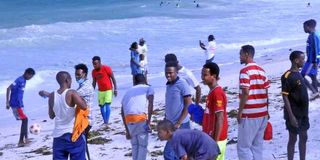Premium
To lift Covid restrictions or not? Lessons from around the world

Mombasa residents relax at the Nyali public beach in Mombasa on July 5, 2020. PHOTO | LABAN WALLOGA | NATION MEDIA GROUP
What you need to know:
- From Beijing in China, to Florida in the United States, Melbourne in Australia to Catalonia in Spain, a second wave of reinfection is forcing governments to tighten restrictions even as Kenya mulls a better evil.
Globally, it’s only Japan, South Korea and Germany, which WHO has cited for their “comprehensive, sustained strategy” against the virus.
For President Kenyatta, the burden of being the country’s Head of State is now weighing on him. Do you kill the economy or your people?
As Kenyans await a decision on controls and measures that have been in place for the last three months, other countries that either eased the measures or lifted them altogether have had to contend with the effects.
From Beijing in China, to Florida in the United States, Melbourne in Australia to Catalonia in Spain, a second wave of reinfection is forcing governments to tighten restrictions even as Kenya mulls a better evil.
Last month, and with expectations that he would reopen the country, President Kenyatta noted the spikes of infections in South Korea, Pakistan and Malaysia after reopening, using this as his reasons to extend the restrictions for a further month.
DILEMMA
“With these two viewpoints on the table, I was not dealing with a right and wrong: I was caught in between two rights. And this clash of two rights placed me on the horns of dilemma,” the President said.
A month later and with a second wave of infections hitting global economies, the situation, if the latest occurrences are considered, is far from perfect for a reopening. Now these countries have reported fresh cases of coronavirus, and lockdowns are being reinforced with World Health Organization chief Tedros Ghebreyesus warning that the pandemic is not even close to being over.
“We all want this to be over. We all want to get on with our lives. But the hard reality is that this is not even close to being over. Although many countries have made some progress globally, the pandemic is speeding up,” Dr Ghebreyesus said.
Globally, it’s only Japan, South Korea and Germany, which WHO has cited for their “comprehensive, sustained strategy” against the virus.
The rest are either still struggling with the pandemic — fighting to quell a new wave of reinfections, having reopened parts of the economy, and as a result accelerating the virus spread.
Top on the list of a second wave of infections is Spain’s Catalonia province, which now becomes the latest in introducing new lockdown measures to over 200,000 residents after a spike in Covid-19 infections.
CONTAINMENT MEASURES
The move comes as Spain, one of the world’s worst hit countries, started easing containment measures and even allowed tourists from the European Union into its facilities.
In the US, Florida and Texas recorded another surge in numbers as the two states battle a second wave of reinfections that has hit the county, with over 52,000 new cases recorded in the last two days alone.
In Florida, the new cases have shot up by 67 per cent in the last two weeks, showing how deadly the reinfections are occurring.
Despite the surge in numbers, Governor Ron DeSantis has said he will not close businesses again and has been at the forefront refusing to enforce mandatory wearing of face masks. However, local governments within the state have reintroduced bans on the public beaches, overnight curfews, and state travel as they try to restrict the spread of the virus.
In Texas, Governor Greg Abbott issued an executive order requiring people to wear face coverings in public.
TESTED POSITIVE
Closer home, South Africa, which has been gradually reducing its restrictions, and allowed its schools to reopen last month, saw some of them closed again after the learners and tutors got infected.
Mid last month, at least 98 teachers and 1,800 learners in county’s Covid-19 epicenter province, the Western Cape, tested positive for the coronavirus, forcing 20 schools to close.
Kenya, which is recording a spike in the numbers, and is angling to open the schools in the next two months, will also have to face such a dilemma, as it seeks to protect the learners from the virus.




